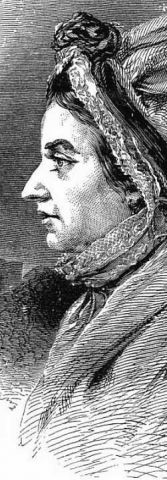 Susanna Wesley (1669-1742) would not be famous if she weren’t the mother of John and Charles. But since two of her boys grew up and shook the world, Susanna has come to our attention, and it’s a good thing. She was a remarkable 18th century evangelical woman.
Susanna Wesley (1669-1742) would not be famous if she weren’t the mother of John and Charles. But since two of her boys grew up and shook the world, Susanna has come to our attention, and it’s a good thing. She was a remarkable 18th century evangelical woman.
She had a lively, disciplined intellect, had read widely, and didn’t mind pointing out where Aristotle was wrong. Her letters and occasional papers, published since her death, are well worth reading. Her accomplishments as a pastor’s wife and homeschooling mother are inspiring.
One story from her life that encapsulates everything she was about is the story of the home Bible meetings she began holding in 1711 (note: about 25 years before the onset of the great revivals connected with the work of her sons, who would have been 4 and 8 years old at this time). The story is told in the 1870 book Anecdotes of the Wesleys: Illustrative of Their Character and Personal History by Joseph Beaumont Wakeley, at p. 66.
While her husband was absent in London in 1711, attending Convocation, Mrs. Wesley adopted the practice of reading in her family, and instructing them. One of the servants told his parents and they wished to come. These told others, and they came, till the congregations amounted to forty, and increased till they were over two hundred, and the parsonage could not contain all that came. She read to them the best and most awakening sermons she could find in the library, talked to the people freely and affectionately. There meetings were held “because she thought the end of the institution of the Sabbath was not fully answered by attending Church unless the intermediate spaces of time were filled up by other acts of devotion.”
Inman, the Curate, was a very stupid and narrow man. He became jealous because her audience was larger than his, and he wrote to Mr. Wesley, complaining that his wife, in his absence, had turned the parsonage into a conventicle; that the Church was likely to be scandalized by such irregular proceedings; and that they ought to be tolerated no longer. Mr. Wesley wrote to his wife that she should get some one else to read the sermons. She replied that there was not a man there who could read a sermon without spoiling it.
Inman, the Curate, still complained, and the Rector wrote to Mrs. Wesley that the meetings should be discontinued. Mrs. Wesley answered him by showing what good the meetings had done, and that none were opposed to them but Mr. Inman and one other. She then concludes with these wonderful sentences: “If after all this you think fit to dissolve this assembly do not tell me you desire me to do it, for that will not satisfy my conscience; but send your positive command in such full and express terms as may absolve me from all guilt and punishment for neglecting this opportunity for doing good when you and I shall appear before the great and awful tribunal of our Lord Jesus Christ.
Were not these the first Methodist meetings held by the Wesleys?
Can we wonder that Isaac Taylor says that “the mother of the Wesleys was the mother of Methodism;” and that in her characteristic letter, when she said, “‘Do not advise me, but command me to desist,'” she was bringing to its place a corner-stone of the future of Methodism.”
Who can tell the influence those meetings of their mother in the parsonage had upon John and Charles in future years, who were then little boys, and always present!
Question: Was Susanna’s action an example of submission to her husband’s authority?
Was it an example of mutual submission under the authority of God?
Was it a threat?
Whatever it was, I marvel at her way of putting it, and can’t imagine how to improve on it:
“…send your positive command in such full and express terms as may absolve me from all guilt and punishment for neglecting this opportunity for doing good when you and I shall appear before the great and awful tribunal of our Lord Jesus Christ.”